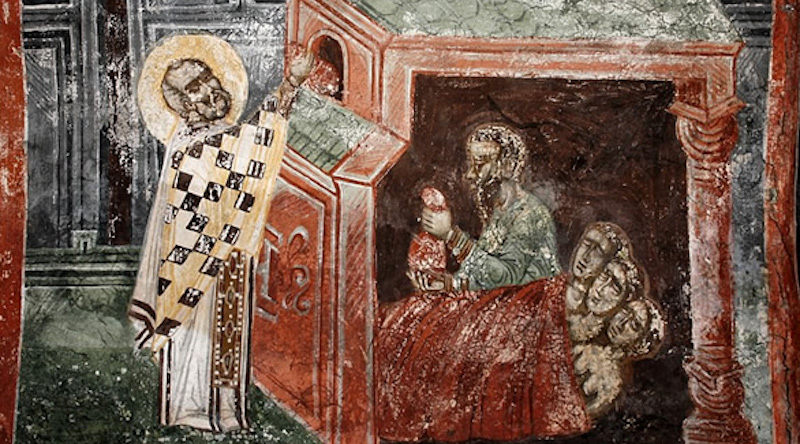Christmas is around the corner: lights, sales, candy canes and inflatable reindeer are already all around us. These Christmas accoutrements have become just as traditional as a family gathering in the living room. Every year these trappings show up, and every year the same people show up, whether we are happy or less than happy to see them. Curiously, this is something that seems to plague people every year: “What do I do when that relative gets here? How will I survive him this year?” A legend from the life of St. Nicholas can teach us a lesson.
The legend goes that St. Nicholas gave gold to a poor father of three daughters in order to pay for their dowries but this story is often retold incorrectly (likely to spare parents of young children some uncomfortable conversations). The real story goes that their father was so poor that, as the original source gently puts it, he was going to “abandon [his daughters] to the sin of lechery” for profit (The Golden Legend: St Nicholas). When St. Nicholas discovered this plan, “he had great horror of this villainy, and threw by night secretly into the house of the man a mass of gold wrapped in a cloth.” The father was no saint, but luckily, Nicholas was. He looked beyond the financial and moral brokenness of the father and gave him the means to save the girls. Instead of thinking of his moral depravity, he thought of his desperate need.
The contrast between a father selling his daughters and even the most aggravating of our relatives may seem vast, but there is a lesson to be learned here. Certainly, people with eccentricities, strong opinions, and distasteful personalities can ruin a vacation or bring a celebration down, but Christ calls us to love them anyway. We must realize all are made in his image and likeness. The question becomes “How can I see this person as a reflection of Christ?” The answer is hard to see, but thank God for sending us St. Nicholas as an example. It is not for us to pass judgment, but it is for us to love. Saint Nicholas’ love, in spite of the man’s deep moral depravity, saved three lives. One can call to mind the calls of Saint Matthew and Saint Peter, Jesus’ encounter with Zacchaeus, and his associations with tax collectors and prostitutes. “Those who are healthy do not need a physician, but the sick do” (Luke 5:31). We are called to be Jesus in these moments and love even the irksome.
This is easier said than done, and when we are sitting there with someone who is the human equivalent of sandpaper, what can we practically do? Hillaire Belloc, a famous author, wrote about this very subject and we can turn to him for a solution. In Belloc’s The Path to Rome, he speaks about the ‘mania of universities’ and offers advice to help us avoid being driven mad by it: “use one of those three phrases which keep a man steady and balance his mind, I mean the words (1) After all it is not my business. (2) Tut! tut! You don’t say so! and (3) Credo in Unum Deum. . .” These phrases are both comical and deep. First, do not get caught up in things that have no bearing on your life. We should realize that some subject matters only serve to upset people. Right now it is Christmas in your living room: you can wait to solve all the world’s problems at the New Years party. Next, if someone drones on about something, listen attentively. Just enjoy time with him, even if it is listening to their manifesto. Your gentle listening might even warm his heart a little. Finally, stay grounded in faith and love. Stay grounded in the knowledge that God loves you and cousin Fuller.
Real human connection in this age is decaying, especially in families. Reaching out to others during the Christmas season is important. “Love those who hate you, and pray for those who persecute you” (Matt 5:44). Indeed a potent teaching, but perhaps in reading this article, one can also take away love those who annoy you, and pray for those who disagree with you. A simple teaching from Jesus, lover of the broken and annoying.
✠
Image: Radul, Nicholas Gives Dowry Money (Wikimedia Commons)







